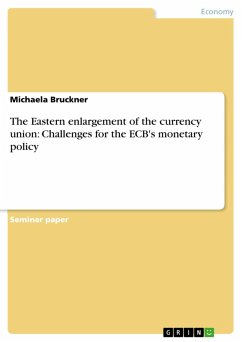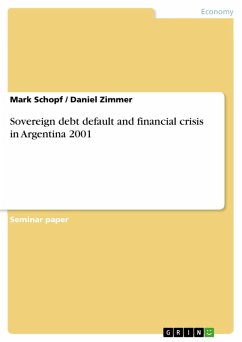
Sovereign Debt Crisis and International Financial Architecture (eBook, ePUB)
Sofort per Download lieferbar
Statt: 18,95 €**
16,99 €
inkl. MwSt. und vom Verlag festgesetzt.
**Preis der gedruckten Ausgabe (Broschiertes Buch)
Alle Infos zum eBook verschenkenWeitere Ausgaben:

PAYBACK Punkte
0 °P sammeln!
Seminar paper from the year 2006 in the subject Business economics - Economic Policy, grade: 2.0, University of Osnabrück (Fachbereich Internationale Wirtschaftspolitik), course: Schuldenkrisen, language: English, abstract: If we have a look at the composition of total debt of different countries it is easy to see (Figure 1.2) that from 1992 to 2002 the advanced countries' total debts mainly consisted of domestic currency, whereas those of emerging market countries where mainly borrowed in foreign currency. If we focus our view on sovereign debt only, this difference vanishes. From 1980 to 20...
Seminar paper from the year 2006 in the subject Business economics - Economic Policy, grade: 2.0, University of Osnabrück (Fachbereich Internationale Wirtschaftspolitik), course: Schuldenkrisen, language: English, abstract: If we have a look at the composition of total debt of different countries it is easy to see (Figure 1.2) that from 1992 to 2002 the advanced countries' total debts mainly consisted of domestic currency, whereas those of emerging market countries where mainly borrowed in foreign currency. If we focus our view on sovereign debt only, this difference vanishes. From 1980 to 2003 about 99.7 percent (Table 1) of sovereign debt in emerging market countries was borrowed in foreign currency. In advanced economies it was slightly less (92.5%). Nevertheless, in both cases the U.S. dollar was the dominating foreign currency. A reason for this might be that this currency is considered as very important in international trade. A comparison between these facts leads me to the conclusion that private persons in advanced countries trust their own currency, whereas private persons in emerging market economies seem to trust foreign currencies. Otherwise the currency composition between total debt and sovereign debt would not differ so much from each other. Another interesting fact concerns which other currencies states prefer to borrow in. They like advanced economies' currencies instead those of emerging market countries. Another important point concerning public debt structure is their composition structure concerning maturity. It can be seen (Figure 4.2) that during 1988 the average maturity of sovereign debt issued in both kinds of countries was little below 8 years. But during the following 14 years the average maturity rate in emerging market countries decreased to about 5 years while the maturity rate of advanced countries sovereign debt increased to almost 10 years. This tendency towards short-term debt can also be seen on Figure 4.1. It is interesting to note the fall in 1999 in both markets (Figure 4.2) which was nevertheless stronger in emerging countries.[...]
Dieser Download kann aus rechtlichen Gründen nur mit Rechnungsadresse in A, B, BG, CY, CZ, D, DK, EW, E, FIN, F, GR, HR, H, IRL, I, LT, L, LR, M, NL, PL, P, R, S, SLO, SK ausgeliefert werden.













